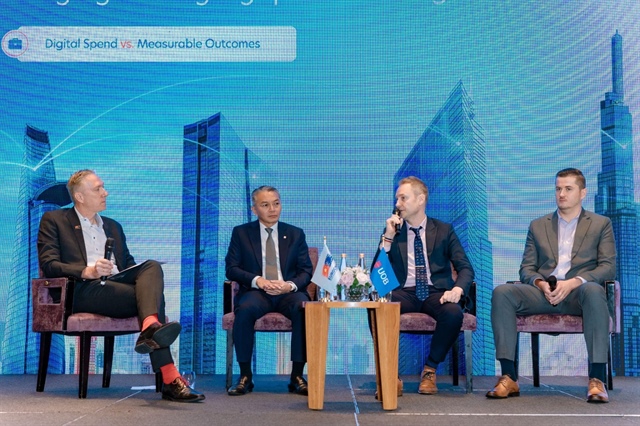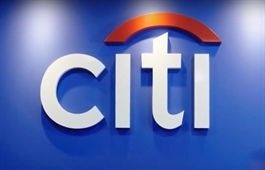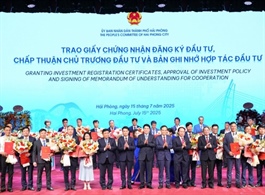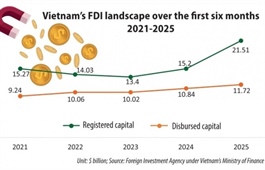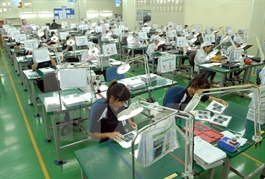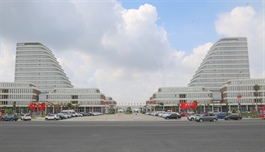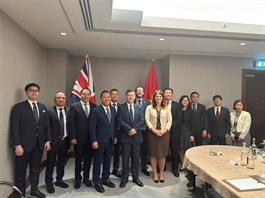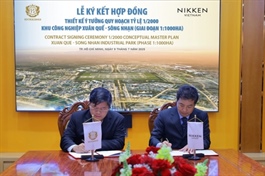Experts outline roadmap for businesses in new era of growth
Experts outline roadmap for businesses in new era of growth
At the “Vietnam Business Outlook 2025” event on July 9, co-hosted by UOB Vietnam and EuroCham Vietnam, experts shared insights from the UOB Business Outlook Study 2025, mapping out pragmatic strategies for businesses to stay competitive in a fragmented global environment.
As geopolitical tensions and global supply chain shifts accelerate, Vietnamese enterprises are at a pivotal crossroads. Resilience and readiness, not optimism alone, will determine whether they can move beyond low-cost assembly to become value-adding links within ASEAN’s interconnected supply chains.
|
According to the UOB Business Outlook Study 2025, nearly 90 per cent of Vietnamese firms plan to increase investments in digital transformation.
Yet only 65 per cent believe these efforts are delivering tangible outcomes. This raises a critical question: Is digital transformation creating measurable value, or is it still being treated as a checklist exercise?
|
According to Vlad Savin, a partner at Acclime Vietnam, there is often a disconnect between ambitious digital transformation goals and operational realities.
“Beyond infrastructure gaps, challenges include limited availability of specialised digital talent, overestimated government support for technology adoption, and cultural resistance within organisations. Bridging these issues requires recalibrated expectations and stronger collaboration between enterprises, academia, and policymakers,” said Savin.
With rising operational costs and sustained growth pressures, businesses must reposition digital transformation from technology adoption to outcome-driven optimisation that strengthens their operating models.
Experts agreed that environmental, social, and governance (ESG) standards are increasingly shaping global supply chains, particularly for export-driven businesses. More than a regulatory obligation, ESG is now a passport to access higher-value markets.
Wouter van Ravenhorst, managing director at Control Union Vietnam, noted that many Vietnamese firms already comply with international ESG standards and recognise compliance as a gateway to global markets. Yet global buyers increasingly expect ESG to be embedded as a core business pillar, particularly as requirements around carbon emissions, recycling, and plastics management tighten.
“Companies that move early will secure market access and gain long-term strategic advantage,” said van Ravenhorst.
Lim Dyi Chang, country head of commercial banking at UOB Vietnam, added, “Early ESG integration helps businesses avoid exclusion from supply networks and build a sustainable competitive edge in premium markets.”
Today, supply chain stability requires more than logistics capabilities. It demands speed, transparency, and regional connectivity, particularly within ASEAN’s intra-regional trade flows.
According to André de Jong, a board member at EuroCham Vietnam, Vietnam is steadily on the way to becoming a high-value contributor within ASEAN supply chains. To further this transformation, the key lies in accelerating automation, advancing digital integration, and aligning with international ESG standards.
“At the same time, sustained investment in infrastructure and the development of a highly skilled workforce will be essential to strengthen the country’s strategic position in the regional value chain,” said de Jong.
UOB’s fresh study revealed that 34 per cent of Vietnamese firms are impacted by geopolitical and logistics challenges, with nearly half concerned about rising costs from new trade policies.
The shift in European investor strategies highlights a clear imperative: beyond market entry, businesses need deep operational capabilities for sustainable growth.
André de Jong elaborated that European firms are moving beyond transactional models, focusing on value chain integration, strategic partnerships with local players, and advancing ESG and digitalisation in tandem with Vietnam’s growth.
Meanwhile, Chang noted, “While 89 per cent of Vietnamese firms express intent to expand internationally, most lack integrated models to execute effectively. Scale alone creates value only when paired with multi-market operational readiness.
Concluding the session, he stressed, “Survey data is only the starting point. What matters is the ability to translate insights into decisive action.”
From digitalisation to ESG, supply chain transformation to market expansion, success hinges not on whether businesses act, but on their ability to transform strategy into tangible operational advantages.
As a long-term partner to Vietnamese enterprises, UOB is committed to strengthening their operating models, embedding ESG into core strategies, repositioning digital transformation, from broad adoption to outcome-driven optimisation, enhancing supply chain resilience, and pursuing cross-border growth through the group’s ASEAN network and dedicated foreign direct investment advisory expertise.
|
As geopolitical complexities deepen and supply chain pressures mount, Vietnam Business Outlook 2025, co-hosted by UOB Vietnam and EuroCham Vietnam, brought together over 60 senior leaders from foreign-invested companies, Vietnamese enterprises, and strategic partners. The event featured insights from Lim Dyi Chang, country head of commercial banking at UOB Vietnam, and a thought-provoking panel discussion with experts from EuroCham Vietnam, Acclime Vietnam, and Control Union Vietnam. Explore the full event coverage here: https://www.uob.com.vn/business-en/events/vietnam-business-outlook-2025.page |
- 17:15 17/07/2025


